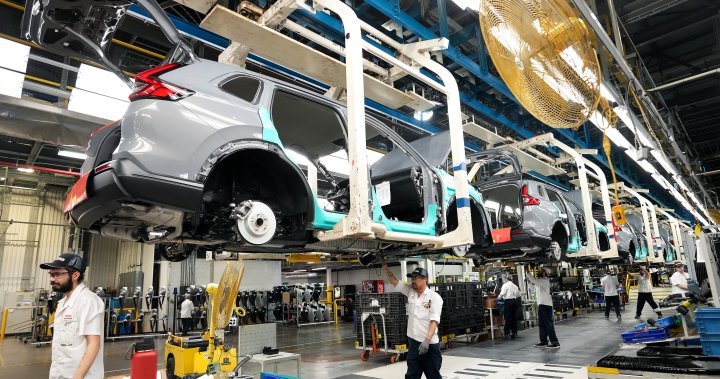As Canada scrambles to avoid tariffs from U.S. President Donald Trump amid a month-long pause, union leaders say there is growing uncertainty in the auto manufacturing sector — an industry that could be forced to shut down within mere days if those tariffs are implemented.
That’s because the North American auto sector is highly integrated, with parts and components frequently crossing the Canada-U.S. border alone before vehicles are fully assembled.
A 25 per cent tariff on Canadian auto parts would upend that international assembly line, manufacturers say.
“Uncertainty, instability, chaos: those are the words I’ve been using to describe the moment we’re in,” said Lana Payne, the national president of Unifor, whose members include nearly 22,000 Canadian autoworkers.
“In the auto industry alone, you would see a mass industrial interruption unlike [anything] I’ve seen in my lifetime. It potentially would shut the industry down in a week at least.”

The Canadian Vehicle Manufacturers Association (CVMA), which represents automakers Ford, General Motors and Stellantis, says parts and components can cross the U.S. borders with Canada and Mexico up to eight times before final vehicle assembly.
That highly integrated regional production model, which dates back decades, has been replicated with success by other auto manufacturing countries like Japan and South Korea, which employ southeast Asian countries to produce parts and supply critical minerals for batteries.
Yet American unions like United Auto Workers have criticized the regional approach, claiming North American free trade rules have allowed automakers to invest more in Canada and Mexico while hollowing out the U.S. auto sector.
Trump has vowed to bring those jobs back to the U.S. — a point frequently raised by Ontario Progressive Conservative Party Leader Doug Ford, who is running for re-election as premier on the promise to protect an industry that employs as many as 100,000 workers in the province alone.
“The threat of tariffs is still very real,” Ford said at a campaign stop in Ottawa on Tuesday.

Get breaking National news
For news impacting Canada and around the world, sign up for breaking news alerts delivered directly to you when they happen.
“Trump is on a mission. He wants to take Ontario’s auto jobs and send them to Michigan and North Carolina.”
Auto exports account for nearly 30 per cent of Ontario’s foreign trade output, according to the CVMA. It also notes over 90 per cent of vehicles made in Canada are exported to the U.S., at a value of $51 billion in 2023.
The federal government says auto exports account for 10 per cent of manufacturing GDP and 21 per cent of manufacturing trade.
Trump has said repeatedly in recent weeks that “we don’t need” Canada’s vehicles or auto parts, and that he wants vehicles purchased in America to be built entirely domestically.
That’s not currently possible, Payne says.
“About 50 per cent of the parts that go into cars built in the United States come from Canada and Mexico,” she said. “And if you don’t have parts, you can’t build cars.
“A lot of these parts companies would not be able to withstand a 25 per cent tariff. It would just make it impossible for them to operate.”

Manufacturers and unions have also pointed out that tariffing North American auto parts will ultimately raise the cost of vehicle production and the sale prices of vehicles sold within the region.
That could open the door for foreign automakers to offer cheaper alternatives to the market, those groups say — something Trump has also vowed to stop by cracking down on Chinese incursions into the auto sector through Mexico.
“In the end, tariffs increase cost, hinder trade, reduce economic efficiency, limit growth, and critically hurt consumers and workers,” said David Adams, president and CEO of Global Automakers of Canada, which represents companies including Toyota, Honda and BMW.
A joint statement from the Unifor Auto Council and Unifor Independent Parts Supplier Council, representing local autoworker and parts manufacturer unions in Canada, said tariffs on Canadian and Mexican vehicles and parts “presents a disaster scenario for autoworkers in all three countries” in North America.
“The cost of building vehicles will rise exponentially. Production lines will freeze, and the effects will ripple to workers across the supply chain. Consequently, and with the cost of new vehicles rising, consumers will shift to relatively cheaper, imported vehicles – those built in non-North American assembly plants,” the statement said.
Examples of how disruptions to the North American auto supply chain can upset the industry have been seen in recent years, including during the “Freedom Convoy” protests that blocked the Ambassador Bridge border crossing between Ontario and Michigan.

The CVMA says 2.5 million truck container crossings were recorded in 2023 — a “significant portion” of which were carrying auto components back and forth.
During the COVID-19 pandemic, a Windsor, Ont., manufacturing plant that builds engines for pickup trucks was forced to shut down for “many, many weeks” because it could not source necessary bolts from China that had locked down, Payne said.
As the countdown to possible tariffs ticks down yet again, Payne and manufacturing groups say Canada needs to look at increasing auto investments within the country to mitigate against reliance on the U.S.
That could include more electric vehicle manufacturing facilities like the ones being built by Honda and Volkswagen, which were lured to Canada by multi-billion-dollar government incentives.
As with other sectors that will be impacted by U.S. tariffs, diversifying trade relationships will also be crucial, Payne says.
“I think we would be in a stronger position as a country right now had we been doing some of this earlier,” she said.
© 2025 Global News, a division of Corus Entertainment Inc.



